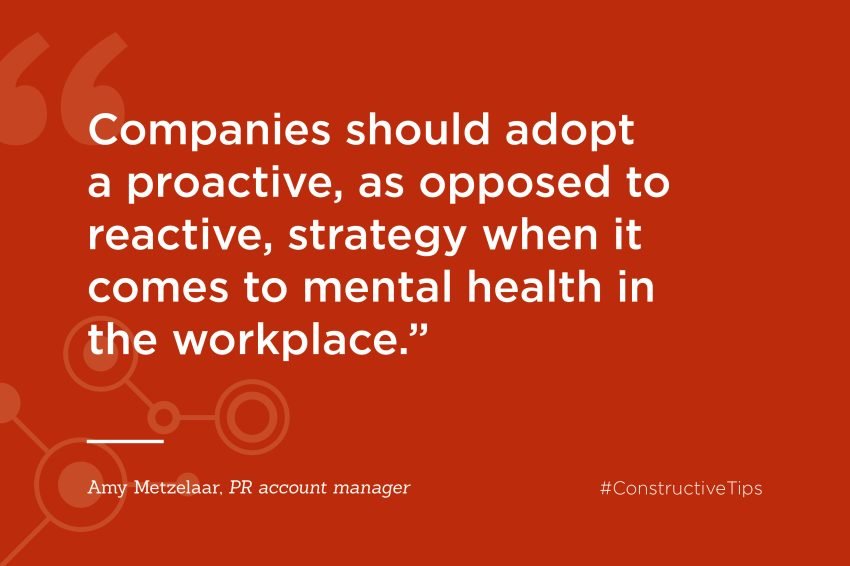How to create a happy, empowered workforce
Published - 1st June 2023

In May, this year’s Mental Health Awareness Week focused on anxiety, bringing national attention to this common emotion that can escalate into an ongoing mental health issue. While this annual awareness week is great for tackling stigma and highlighting how to achieve good mental health, it’s also important not to forget about mental health and wellbeing the rest of the year.
It’s particularly vital for companies to take into consideration the impact of the workplace on employee mental health. Research by Mind Share Partners has shown that mental health can have a significant impact on workplace productivity, demonstrating that the two are inextricably linked.
This is especially important for companies operating across the construction industry, with Mates in Mind reporting that a third of construction workers suffer from increased anxiety levels while two thirds won’t talk about their mental health due to the perceived stigma.
With this in mind, what steps can companies take to create a happy and empowered workforce year-round?
A proactive approach to mental health
Companies should adopt a proactive, as opposed to reactive, strategy when it comes to mental health in the workplace. As well as introducing policies and working practices that are beneficial for the mental health and wellbeing of the workforce, this is an important way of tackling the stigma that prevents so many people – especially those working in construction – from speaking out, with sometimes devastating consequences.
Harris has taken several steps to tackle issues relating to mental health before they arise, such as funding Mental Health First Aid training for three members of staff who are able to provide ongoing and ad hoc support for colleagues, as well as being trained to deal with crises.
We also launched annual stress surveys 2 years ago, which allow staff across the business to anonymously rate and discuss their stress levels at work. The results of these surveys demonstrate where we’re doing well, but also where there’s room for improvement. While our stress surveys have proved valuable, we’re always looking to improve their effectiveness, which is why we’ll be issuing these twice a year going forward – allowing us to assess differences in stress levels at different times of year.
Initiatives like these have a significant impact on creating a workplace culture of openness, which can make a big difference to how psychologically safe people feel.
Creating a supportive environment
Another way companies can create a psychologically safe working culture is by creating a supportive environment for everyone.
This can come in the form of empowering staff to feel able to discuss any causes of stress or mental health issues with their line manager, or it can relate to building positive relationships through social activities – which is particularly important post-Covid where hybrid working patterns are the new normal.
While hybrid and remote working patterns are beneficial for wellbeing for some, it can have a negative impact for others – particularly for increased feelings of loneliness. It’s therefore important for companies to emphasise the value of social events both during and outside of working hours.
Here at Harris, we organise a number of regular social events, from hosting a monthly breakfast club in the office to fundraising activities like our participation in the Leeds Shine Night Walk for Cancer Research UK last year.
Flexibility and trust
Earlier this year, our full team took part in a ‘values day’ to establish our company mission statement and core values. ‘Flexibility and trust’ were frequently raised as values by members of the team, with these two words linked together as one – something we were told was completely unique to Harris.
We’re trusted to work flexibly in a way that suits each individual team member. Whether that’s working mostly from home for childcare reasons or working outside of typical ‘nine to five’ hours in order to pursue hobbies and other responsibilities, this rare level of truly flexible working has a significant positive impact on employee mental health and wellbeing.
In turn, this demonstration of absolute trust in every member of the team also has a positive impact on productivity.
Avoid ‘perkwashing’
It’s hard to escape the buzzword ‘greenwashing’ at the moment, but have you considered whether your organisation is ‘perkwashing’?
While we encourage our team to work flexibly in a way that suits them, it’s important to be upfront about the level of flexibility your business is actually able to provide. As the demand for flexible working and other wellbeing-focused perks continues to influence what people look for in a role, particularly post-pandemic, it can be tempting to overstate commitments in order to attract the best candidates.
This is known as ‘perkwashing’, a type of virtue signalling specific to the workplace. It refers to the exaggeration of perks and wellbeing-focused policies which aren’t being carried out in practice. And as this becomes more prevalent, candidates are increasingly wary of what’s really being offered.
Be honest about what mental health-related benefits you’re able to offer, and if it falls below expectations, it might be time to reconsider way to create a working environment that promotes wellbeing.
Harris »